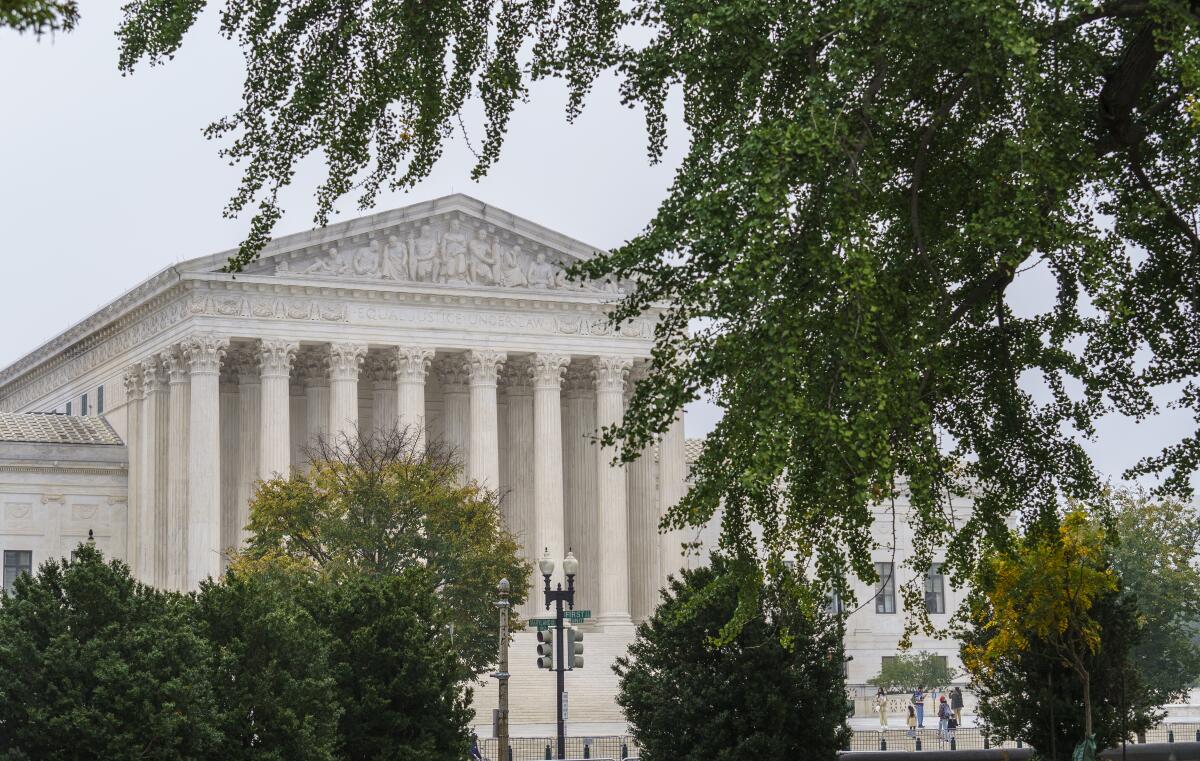Supreme Court overturns 9th Circuit’s rule that favors those seeking asylum

- Share via
WASHINGTON — The Supreme Court on Tuesday set aside a rule used by the 9th Circuit Court in California that presumed immigrants seeking asylum were telling the truth unless an immigration judge had made an “explicit” finding that they were not credible.
The justices in a 9-0 decision said this rule “cannot be reconciled” with law set by Congress that gives immigration judges the authority to weigh often conflicting accounts and to decide whether the applicant is entitled to asylum.
“For many years, and over many dissents, the 9th Circuit has proceeded on the view that, “[i]n the absence of an explicit adverse credibility finding [by the agency], we must assume that [the immigrant’s] factual contentions are true’ or at least credible,” wrote Justice Neil M. Gorsuch in Garland vs. Dai. He said this rule was not justified and gave immigrants the benefit of the doubt in close cases. “Congress has carefully circumscribed judicial review” of immigration decisions, he added.
Typically, an immigration judge hears from an immigrant seeking asylum and may also hear evidence from the government that calls into question the person’s account or reasons for seeking refuge in this country. The judge then decides whether the applicant is entitled to asylum, usually without formally concluding whether the applicant has been credible or deceitful.
If an asylum request is turned down by an immigration judge and the Board of Immigration Appeals, the applicant may then seek a review from an appellate court.
The 9th Circuit Court took the position that any failed applicant’s account would be presumed to be credible and true, even despite conflicting evidence, unless there was a previous finding from an immigration judge or board that the account was not credible.
In the case decided Tuesday, Ming Dai, a Chinese national, applied for asylum as a refugee and said he and his family were fleeing persecution based on China’s policy of forced abortions. He told of his wife being abducted and him being beaten in 2009 when she became pregnant with a second child. “Please grant me asylum so that I can bring my wife and daughter to safety in the USA,” he said in his asylum application.
Only later when pressed did he agree to tell the “real story,” Gorsuch said. “Mr. Dai proceeded to admit that his daughter returned to China to go to school; that his wife chose to return to her job and her elderly father; that Mr. Dai did not have a job in China, and this was why he stayed in the United States,” he said.
An immigration judge rejected Dai’s claim for asylum, and the Bureau of Immigration Appeals agreed, but without formally concluding that his original story lacked credibility. When he appealed, the 9th Circuit said his stated reasons for seeking asylum should be “deemed” as credible and true, and granted him asylum.
In a second case decided with Dai’s, a Mexican national Cesar Alcaraz-Enriquez was arrested when trying to enter the country illegally. He said he feared his life would be in danger if he were returned to Mexico.
Immigration agents learned from a probation report that he had been convicted earlier of abducting and brutally beating a girlfriend in California.
He told agents he didn’t hit her “that hard” and said he was trying to protect his young daughter from his girlfriend. After weighing the evidence, immigration judges denied his bid to avoid removal, but the 9th Circuit granted his appeal.
The court sent both cases back to the 9th Circuit to be reconsidered. Gorsuch noted that as many as 12 of the 9th Circuit’s judges had disagreed with the court’s presumption that favored asylum applicants.
It is the second time in two weeks the justices unanimously reversed the 9th Circuit on an issue of immigration law.
Last week, Justice Sonia Sotomayor spoke for the court in reviving the “unlawful retry” prosecution of a Mexican national who had been deported more than 20 years ago for a DUI conviction (U.S. vs. Palomar-Santiago).
The 9th Circuit said it was “fundamentally unfair” to charge him with unlawful reentry, since the high court later said DUI was not a violent offense warranting deportation. But last week, the court said immigrants who failed to challenge their deportation at the time could not contest it now.
More to Read
Get the L.A. Times Politics newsletter
Deeply reported insights into legislation, politics and policy from Sacramento, Washington and beyond. In your inbox three times per week.
You may occasionally receive promotional content from the Los Angeles Times.











